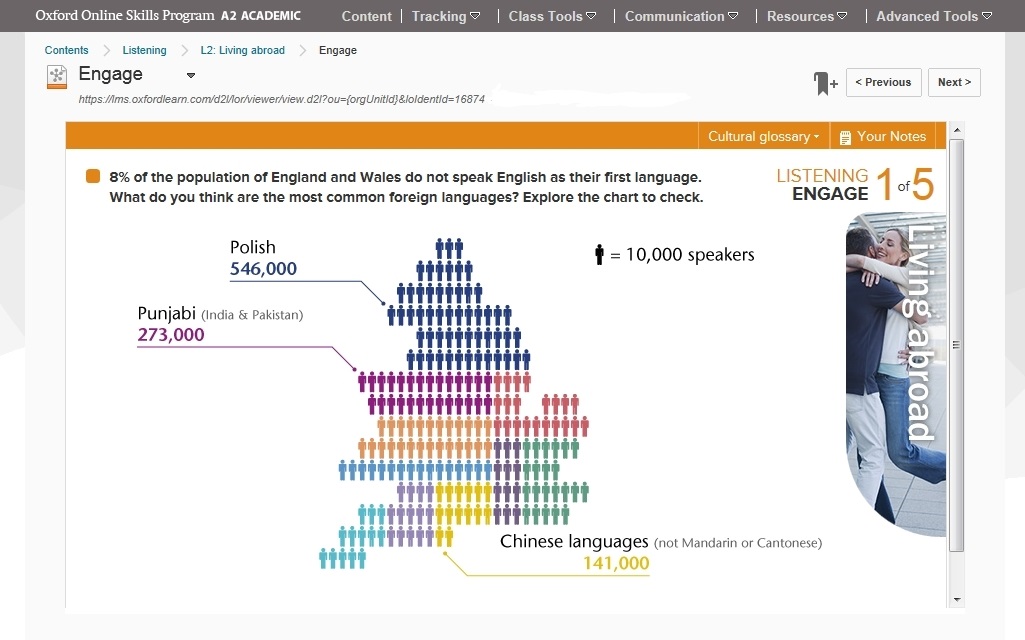 Lara Storton has seventeen years of experience in ESL, teaching English for Academic Purposes and teacher training, and has recently written the Milestones in English Student’s Book and Teacher’s Book at B1+ level. She joins us today to outline steps towards encouraging language learners to continue their study outside the classroom and how to make use of technology and online resources to promote independent learning.
Lara Storton has seventeen years of experience in ESL, teaching English for Academic Purposes and teacher training, and has recently written the Milestones in English Student’s Book and Teacher’s Book at B1+ level. She joins us today to outline steps towards encouraging language learners to continue their study outside the classroom and how to make use of technology and online resources to promote independent learning.
The student-centered approach is becoming more common as teachers realize the benefits of being a facilitator in the classroom, encouraging students to take responsibility for their own learning in collaborative tasks and discussions. Of course, as a teacher you decide what happens in the classroom, but how can you extend learner independence outside it?
Set learning goals
Students come to class with their own individual learning goals. Often their motivation for learning will be goal-oriented: geared towards a specific exam, career or university placement and so getting them to spend time on skills development outside of class – rather than cramming for an exam – can be a challenge. And it can also be difficult for students who do want to develop their independent study skills to decide what to study outside the classroom.
What you want is for your students to become confident in organizing their own learning, studying what they want or need to study in order to achieve their long-term goals so that when they pass that exam or get into university, they can go on working independently and with confidence.
So first of all you need to get them thinking about their own learning goals in more detail. Do some needs analysis in class using questions. For example: Why am I studying English now? What do I hope to achieve in the future by learning English? What are my main strengths? How can I build on them? What are my weaknesses? How can I improve my skills and turn my weaknesses into strengths?
Students can then write down a list of individual learning goals and some suggestions of how to achieve them. Make this an interactive activity to highlight its importance and promote independence from the beginning – get students to discuss their learning goals and make suggestions in pairs or small groups. Take time to review these both as a whole class and individually with each student. This way you can help guide learners towards independent study in a way that requires them to take the initiative.
Get students to think about how to extend their learning in class
Once your students have established their learning goals, you can support them further by making references to independent study during lessons. Get them thinking about how they could extend their learning and build on the skills they have practised in lessons, saying for example, ‘How could you practice this at home?’ ‘Has anyone got any ideas about how you could extend what you’ve learned in this lesson?’
At first your students may need some support with thinking of ideas so you could give them suggestions such as, ‘Read a newspaper and find two more examples for each dependent preposition we studied today.’ ‘Read a short text on a topic you are interested in and prepare to summarize it to a partner tomorrow’. ‘Read an article on a subject you’re interested in, underline all the present tenses and consider why the writer has used each one.’
Over time these suggestions will give students an awareness of a range of independent study techniques and strategies and increase their confidence and motivation to move towards independence.
Take advantage of technology
In terms of motivation, we are lucky to live in an age where technology offers a wide range of self-study options. Most students will have a smartphone, laptop or tablet and are likely to be very adept at using it! This means that they can access a wealth of online study opportunities.
When online practice first became available, technology and programming was limited so exercises tended to be very short. Often they were gap-fill or choose-the-correct-option type tasks which required little ‘thought’. Of course there is a benefit to these more automatic types of exercise but nowadays online study programmes and resources can offer students so much more in terms of skills development. Features such as high quality images, games, audio, video, writing walls and discussion forums add to learner experience helping them to stay motivated and engaged.
From a teaching perspective, online study programmes also act as a ‘first step’ to guiding your students towards independent study – they can work on achieving their learning goals at their own pace and at a level that they feel comfortable with. They tend to be progressive, so once a student is has mastered the necessary language and skills, they can move on to the next level.
One example is the Oxford Online Skills Program. The programme runs at all CEFR levels and offers students the opportunity to work on either General or Academic English. Students can log on in their own time and choose what they want to study in whatever order they like in order to achieve their learning goals. An advantage is that the study material is generic – each module is based around a specific language focus, skill or topic so it can be used alongside any course and to suit varied interests.
Tapping into those interests is extremely motivating so encourage your students to engage with online material as much as possible not only on official study programmes but also through authentic websites and social media.
Build independent skills online
Once your students start to become motivated to study independently, encourage them to adopt a systematic approach to build their skills. In class, have regular discussions about how students can use technology for independent study, for example by listening to podcasts or online lectures, or by reading articles on their subject or area of special interest.
You could set aside a regular time in class where students discuss how they have studied independently this week and say what they have learned, what they have practiced, what they feel they gained from the study and how they will continue to develop those skills in future.
An online study programme can also help to guide students towards a systematic approach which they can then use with authentic materials. For example, in the Oxford Online Skills Program, modules are set up like mini-lessons giving students the opportunity to raise schema (activate their own knowledge and ideas and relate these to their experiences) by looking at an image or watching a video, and then complete a series of exercises including language, vocabulary or form focus. These build up to a final productive ‘task’, either written or spoken, and finally a ‘reflective’ task prompts students to consider their own learning experience and performance.

This type of structure helps students to get into good independent study habits which they can then apply in the future at home or at college or university with authentic texts on subjects that are interesting to them or important to their course of study or career.


I try to encourage my students to become more independent. I give instructions and a few examples which we work through as a whole class. When it comes time for the assignment or classwork, I ask them to complete it alone. If they don’t understand I will help as needed, but I also point out the page numbers to refer to when I cannot be there.
[…] I found another great article from OUP’s blog. It’s great to encourage ELLs to become more independent. You can find it here. […]
Thanks for sharing this, Lara! I support your points about using modern technologies in the classroom. From this article I learned about the new agent of checking students’ work for possible plagiarism: https://www.survivingateacherssalary.com/how-your-professors-can-double-productivity-using-the-unplag-corporate-plagiarism-checker
Hope, you will find it useful!